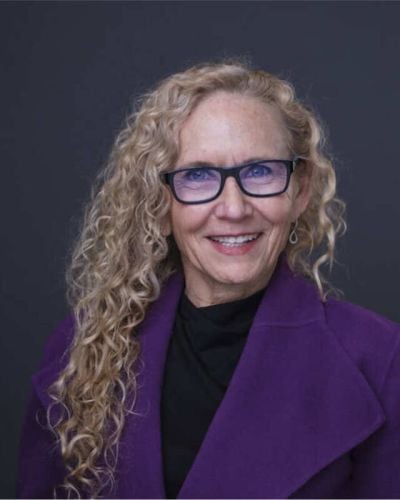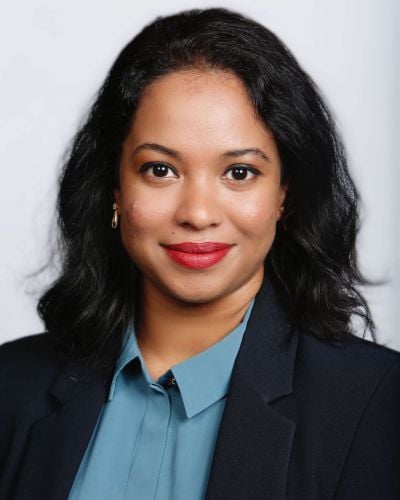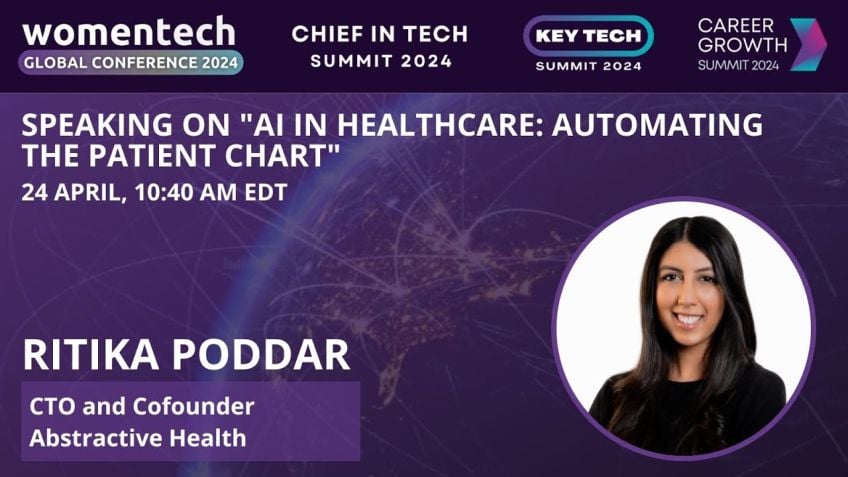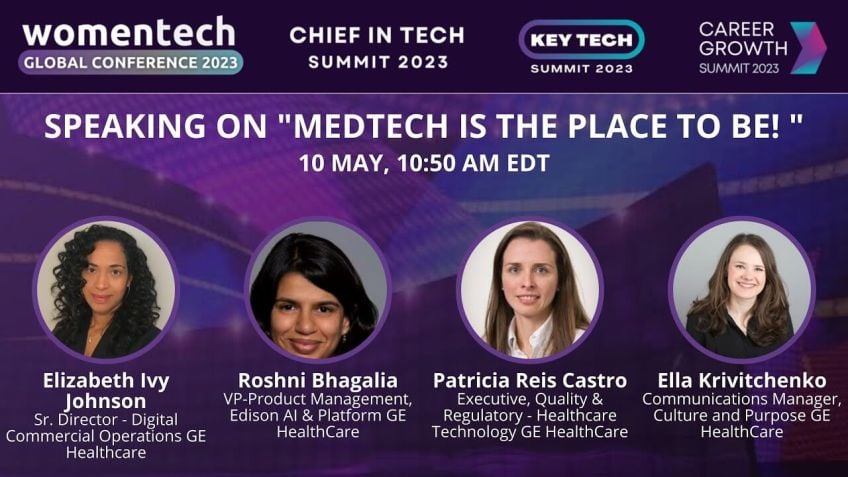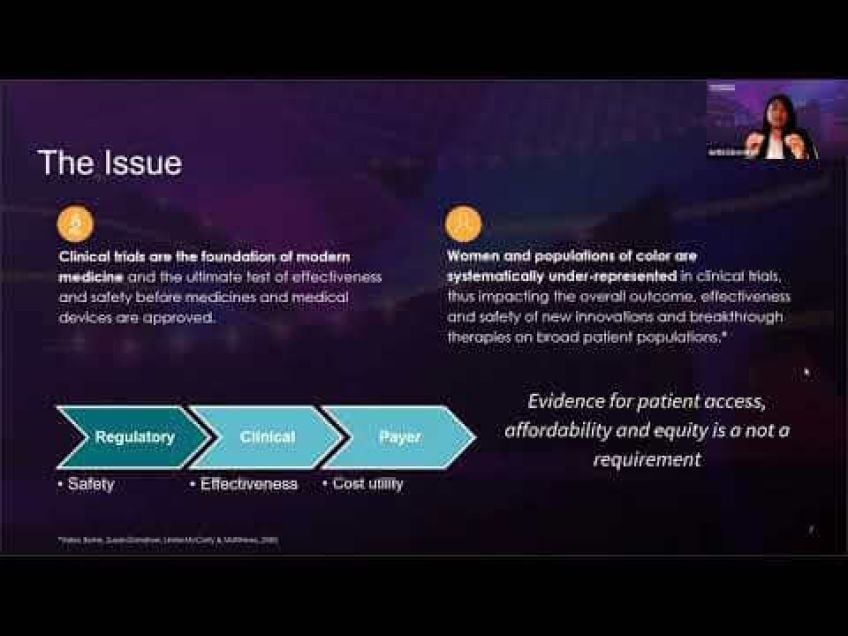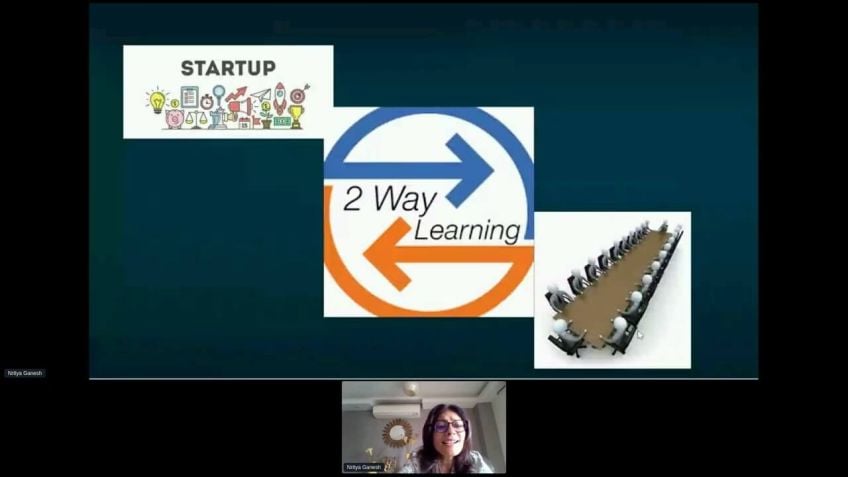Create a world where healthcare has no limits by Graciela Perez
Graciela Perez
VP, Chief Digital Program OfficerGarima Mathur
Director - Product ManagementManali Patnaik
Sr Product ManagerCreating a Future Where Healthcare Has No Limits: A Discussion with GE Healthcare
In today’s digital age, discussions about the transformative breakthroughs taking place in the medical technology industry are increasingly common. These conversations often center around complex, innovative healthcare solutions that are changing lives, providing practitioners with essential tools, and simplifying the healthcare journey for patients. One organization at the vanguard of this medical revolution is GE Healthcare.
In this roundtable discussion, we bring you inspiring thoughts from two dynamic leaders at GE Healthcare - Manali and Garima. Join us as we delve into what motivates them, their work in the MedTech space, and why they believe GE Healthcare can create a future where health care has no limits.
A Look at GE Healthcare
When we talk about GE, people often think of appliances like washing machines. However, GE Healthcare, a prominent arm of the company, focuses on medical technologies and services. Their product portfolio includes everything from machines that measure heart activity to devices for x-rays, CT scans, and MRIs.
Thanks to ongoing innovation, behind these machines lies a world of advanced technology - artificial intelligence, data analytics, and cutting-edge algorithms. These technologies help enhance healthcare provider workflows and foster better decision-making – all in the service of improving patient care.
Leaders in Healthcare Tech: Manali and Garima
Garima and Manali, influential figures at GE, sat down to share their experiences, motivations, and views on the future of healthcare.
Garima, a problem-solver at heart, is passionate about leveraging tech to create tools and solutions that change lives. She spoke about her role at GE, focusing on building an operating system comparable to an IOS, channelling essential information to doctors when they need it most to improve patient care.
On the other hand, Manali, with cross-industry experience from aviation to healthcare tech, stressed GEs supportive work culture and the countless opportunities she’s had over the past decade at the company. Now in a unique role connecting startups to GE, she's helping bring new and effective solutions onto the Edison platform.
Both leaders emphasized GE Healthcare’s determination to solve real world problems and make a lasting positive impact on healthcare providers and patients.
What Motivates Us?
Garima’s Perspective
Garima's motivation is rooted in her personal experience with healthcare. At 14, she underwent an MRI scan, a worrying period for her parents. This experience not only highlighted the anxiety that often comes with life-changing health decisions, but also the critical role technology plays in healthcare. This has inspired her to continue innovating at GE, knowing that the work she does will directly improve patient care.
Manali’s Perspective
For Manali, what started as a desire for autonomy in her role has evolved into a deeper sense of purpose. Meeting with startups and hearing their compelling stories of trying to make a positive difference in the healthcare sector has motivated her to go beyond the 9-5 routine and commit to improving healthcare technology.
Challenges and Triumphs: Stories from the Frontlines
Though the MedTech landscape is, at times, challenging, the rewards are worth it. One inspiring anecdote recalls a start-up founder who lost both parents to COVID-19. Still, the founder remained committed to contributing to the healthcare industry. Such stories amplify the importance of the work done at GE Healthcare and other MedTech companies.
Join the MedTech Revolution
As Garima rightly notes, you don’t need to be a computer scientist to contribute to MedTech or GE Healthcare. The industry offers vastly diverse roles, each serving a key part in improving the healthcare sector. If you're someone with a curious mind, likes to solve complex problems or passionate about making a mark in healthcare, MedTech could be the ideal place for you.
In conclusion, GE Healthcare’s determination to revolutionize global healthcare technology is crystal clear. By leveraging the power of artificial intelligence, data analytics, and cutting-edge products, GE continues to break down the barriers in healthcare and create a promising future, devoid of limits. Whether you're in the medical field or a hopeful newcomer, we hope you'll consider joining the MedTech revolution.
Video Transcription
Mhm
Hello everybody. Um today we have a really uh great panel that we're bringing to you um to, to share with you around uh creating a future where healthcare has no limits. And we're gonna start a little with a little introduction on G health care. I and then also um going to have uh Manali and Grima with our first question, they'll introduce themselves. So G health care, um when people think ge a lot of times they think um washing machines and things like that and GE actually healthcare makes all of the uh medical equipment that you might find in health care setting, everything from the machines that measure heart activity to x rays and CT scans and MRI S.
So if you've ever been in a hospital, you, you've more than likely uh interfaced with uh one of our devices and then behind those devices, uh it's um is, is a lot of technology and specifically uh more uh artificial intelligence and data analytics and um all kinds of kinds of algorithms that help us take the information that come from the information uh from those machines to help health care providers improve their work flows or help them make better decisions.
And so, um we're really excited to have uh Manali and Rima here today today to share a little bit about what they do in that space, why it's important. And um and this is around Senator, if you're looking for a career with purpose, something where you can say, well, what I do directly impact other people positively. Um And let me tell you, MedTech is the place to be. And hopefully, after hearing from Manali and Garima, you'll agree. So I'm just gonna start um with uh Garima kind of what, what who are you, what do you do at the health care? Um Please, please uh you know, just share a little bit about what you do and your sense of purpose
sounds good. Thank you, Grace for the question. Uh Very uh nice to meet you all virtually. Um I uh so talking about myself, right? Like, so I, I, I think about I'm a person who loves to solve problems who loves to see new opportunities in the questions that arise. And I think uh a part of me being very inquisitive about things, helps me um grow and helps me do what I do at Ge. So at ge there is a lot of fun things we do and it is um it is difficult when you think about these spaces in health care. Uh And MedTech, we always feel like there are very, there are these are very serious, uh things, right? Like being serious. They are also very, very fun. So we are building, we're building things that actually it can impact people's life. But how do we do that? Right. So if you, the easiest example I give you, right? Like before we had iphone, before we had the I OS, the information, the life that you had was very different and now what you have is extremely different because there is so much information, some good and a lot, lot bad and a lot and a lot beneficial is on your fingertips, right?
So what we're trying to build a GE is a, is an operating system, right? That you can think about an I OS, which can provide a lot of useful information to the doctors, uh to the, to all of the care delivery team when you're sick or when you actually need help. So, so it is, it is in the information, right? It is whatever decisions we make in life, right? Whether it's about your career, whether about, about, about actually shopping, whether you're buying a dress, it's all about what information is available to you, right? Like do you have the options? Do you have the information of how you're going to look at different things to make a decision? So that's what we're trying to do. A G we're trying to bring a lot of information from a lot of different people who are building a lot of cool things around the world and we're making it very readily available to the doctors when they are treating a patient. So, for example, right. So when you go to a doctor say you have a cough and cold and you are there now and when they are looking at all of your symptoms, they are looking at, ok, you came to me like a year back or you did not appear for your annual appointment.
You're probably should al also be checked for a blood test or you should also do XYZ things to, to provide you a better health care when you're already there. So these are a lot of you can say information that we're trying to make very much available on fingertips of the um healthcare uh life cycle so it can better serve the patients.
Thanks, Karima. It sounds like you. Um you have a fun job trying to create products that uh health health, health care pri uh providers and the patients they serve Manali. Uh please share with us. So there's a little bit of difference here. So Rima has about 20 years of experience and healthcare tech and um and Manali is newer to healthcare tech. So she actually was in uh several other industries, even aviation before she came to health care technology. So Mli tell us a little bit about what you do at G health care and um and what's exciting about it?
Oh, thank you. Thank you. So much Grace. It's great to be here uh with uh with both of you and uh you know, just talk to the audience here. So, really looking forward to our session and you're absolutely right, Grace, I think uh I've had quite a journey. It's almost been a decade long journey with GE and about two years with G healthcare, right? So I joined GE right out of college and I've never had a reason so far to look for something outside. Because every two years, I been grateful to be working with leaders, mentors, managers who have given me so many newer opportunities and you know, challenges which absolutely has kept me occupied as well as it is. It has been a lot of fun. You know, this almost this 10 years, I think it's been a fantastic journey now to tell you a little bit more about what I've worked on in this, I would say almost a decade long journey, right? So I started off as a software engineer, right? So I did my bachelor's and my master's in computer science total nerd loved it all the way. And I joined uh G healthcare in fact, as an intern and that's when I fell in love with the culture in this company where, you know, you have so many people to look up to, to reach out who are there to help you.
So your success translates into their success, which I think for an early career professional is very, very important, you need that care, you need that support and I've received that tremendously in this company, right. So I joined healthcare as an intern thereafter. Aviation as a full time software engineer was working, you know, on the code, what are the problems which are internal, as well as external teams are facing? After that, I wanted to get some more learning on the business side of things and GE is pretty much known as a leadership factory, right? So if you look at leaders in any of the Fortune 500 companies, you would see pretty much every leader out there has had a stint in GE and she is known for its leadership programs. So that was very inspiring for me. So whenever I saw, you know, one CEO or a CTO or a cio invariably every single time they would have had spent some time in GE and they always spoke very fondly about their experience. So I thought, how about I try to get some experience in a leadership program and see what the jazz is all about, right?
And to tell you the truth, probably the most enriching part of my time in GE has been part of something which they call the digital technology leadership program. It's a two year program rotational, one of its kind where, you know, young out of college professionals get a chance to work with every other business of GE, right? And after that I did another program which is called corporate audit staff, which is more about enterprise risk management and so on. And you know, again, monthly rotations in different parts of the country. So you get a chance to work very closely with leaders across different g businesses, understand what are the different pro problems they're solving and also contribute to them. And it's very time box. So you have real impact in a very short period of time. So, you know, GE had been very, very generous to me in providing all the opportunities. And after my time in the leadership programs, I thought it's time to go back to the business and contribute to real life problems and how and use all the learnings I've had. So that's when I was looking for opportunities in G healthcare because I felt the purpose was very, very strong.
And uh you know, one of the, the G has always been known for the fact that they do not bias based on the experience you have, they look for people who have done bits and pieces of a job and then give, give them that opportunity to do an end, to end, you know, prove their middle end to end.
So that's when I got hired into G health care by one of my mentors Irvin and in the product management space and fantastic journey. I play more of a matchmaker I would say. And that's very interesting because what I do is I connect start ups or scale ups with G healthcare. So the platform which Garima spoke about and explain beautifully, right, the G healthcare Edison platform and sort of drawing parallels between an I Os or an app store. That's exactly what I'm focused on as well. How do we get the right apps and solutions onto the platform? What are their needs? What would make it easier for such a solution to come on to G healthcare platform? And how can we create a platform where a healthcare provider can just log on to the GE app store? Look for a solution, click on it, try it out, buy it and use them, you know, radiologists, physicians, clinicians, nurses, everybody. So that's part of my job. It's been great learning so far and again, uh very happy to be here in the forum with the both of you. Thank you.
Thank you uh Karima and Manali for, for sharing a little bit, just a tiny bit of your experience. Um I listen to you and your jobs are actually quite large and you work with um large teams. Uh It, it's also interesting that, you know, from your perspective and not to hear about the leadership programs that we have. And uh I totally agree that everywhere we go, we see our GE colleagues, you can leave GE but GE never really leaves you is what I like to say. So, you know, I I'm a little further along in my career. Uh And um you know, one of the things that's so inspiring about our med tech company is um more women, mostly women in this conference. And I'll give you an example of where we're making an impact. So um 50% of women have dense breast tissue and 71% of cancers actually happen in women with dense breast tissue and with um people like Garima Manali, really driving innovation and technology within our company, we have developed equipment um that can and devices that better detect cancer in women with breast uh dense breast tissue.
And I can remember, you know, early on in and not having that technology, I would always have to go on to an extra ultrasound and extra um testing because um the, the mammography and those are the devices that are used to test for um our mammograms uh for, for uh breast cancer prevention uh weren't sufficient and so creating um a future where health care has no limits really is what Manali and Rima are talking about.
And so Karima, I'm gonna turn to you because you have um a little more uh time in the healthcare sector. And um I wanna ask you, you know, what keeps you motivated with that sense of purpose? You've been here a while. Do you examples of what's motivated to keep you in MedTech and specifically here at G healthcare?
Yes. Um So I think, you know, as any you would think about any health care company or a space that you work in, that it provides you some purpose of why you come to work. Right? For me, there was a very personal experience I wanna share. So I was 14 years old and I have to get an MRI scan and I remember how much my parents were worried about it and they were obviously like, concerned what the um what it would be and you know, what would the result be and, and you know how the future looks like my da for my daughter.
And there was a serious concern, right? There was a serious moment in my family and that experience touched me really deeply, right? So I grew up thinking about, hey, like, you know, it was so hard for my family and obviously it was only, you know, gladly things get worked out and everything was fine. But if everybody right at some point of time goes through like this type of very critical challenges, right? And those are the moments right that you need all the help that you need the technology to work for you, that you need that, hey, hopefully the decision makers who are, who are actually going to make this decision for me. These are the right decisions, right? So when I come to work every day, honestly, there is a purpose that drives me right to build products, to build things that actually can be helpful to somebody out there who is in need, right? So it is a very strong feeling right that um if you, you, when you read what you're building, what you're doing and a lot of us are just fortunate I feel right that we have this connection that is going to be used by one of us, right?
So everybody, right? It's not really like, you know, a few people that are a percent of people who are using healthcare, right? All of us are touched by it. And my goal is to whatever we build at ge right is, is used uh in the best way possible to provide the technology in time of need that people really um are looking for. Um and I feel like, you know, in this era and time, right? But there is so much, right? Like a I doing a lot of different things, it becomes more critically important, right? The responsibility, the the work that we do and how it can really tremendously change the health care in the next five years. So we want to build these big, we call road maps or you can say the future products, right? That actually will be very relevant in the setting that will be used in the best way possible and it will help a lot of patients out. So that's what I feel it energizes me every day and I love to do what I do.
Thank you, Rima. I motivated just listening to you, man, please share with us your, your sense of purpose and, and how do you stay motivated? You, you probably work with some um uh you know, start ups or people who want to jump on to the Edison platform. Uh And there's certainly going to be things at work and things that don't work uh during your work day. How do you stay motivated in MedTech?
Yeah, absolutely. Uh Thank you, Grace. And I think, you know, it's very interesting when you ask this question to anybody in the healthcare space, you get to hear the personal side of things, you get to know a little more about them as a person. Like I learned a little bit more about Garma today, right? So I, I think it's very interesting to ask that question about purpose, you know, to tell you the truth. When I started off with healthcare, I was somebody. And you know, I'm, I'm, I'm quoting Daniel Pink. Actually, he's written a book called Drive which talks about the three things which motivate a person. It's either purpose, autonomy or expertise. I think when I joined healthcare, I was more of an autonomy person. I felt like owning a problem solving it end to end and showing that success metric that hey, I have solved the problem successfully and putting it out there. Adding it to my resume was something which was really inspiring to me, you know, solving different varieties, problems across different areas. Now, once I joined healthcare, I wasn't sure if that was gonna change, you know, because I thought again, it's another problem you're solving, working with uh a very uh smart group of people.
Now, what really impacted my perspective was when I started speaking to all of these start ups. Now, let me tell you that is not an easy space to be in. It requires immense courage. And what was most inspiring to me is I speak and speak to and meet with several various start up founders, what they're trying to do, how we can help take them forward. And uh one particular story I think really struck a chord. You know, it was II I won't take the name because of, you know, it's personal information, but there was this person who lost both their parents during COVID and this was back in India and this was because of an inaccurate diagnosis. You know, they are a small start up based out of India, working in the pneumothorax space on, you know, chest lung nodules and detecting the issues there. And they were, they had just started out in the start up space trying to make a difference in the world. That is when something like COVID hit India and India as you know, huge population, we are still a developing country and it was such a blow to this person that they, they even decided to change the whole trajectory of their company saying first, they will focus on telehealth rather than trying to solve a problem and get a bind from a big company like, you know, a G healthcare or a Phillips or a seamens.
First, they were like, let me try and make a difference to the lives of these people and see what we can do and use that knowledge and see if any other company who's interested in solving the same mission has the same vision if we can collaborate with them. So it is, it is so compelling to meet these new people every day and I need start ups globally, right? Be it India, us, Europe, every other country out there, the sense of purpose and the sense of, you know, trying to solve a bigger problem, which is way bigger than all of us. It is not easy trying to get a funding, not knowing whether your company is gonna be there tomorrow or not, if with one wrong step. So I think we have sort of chosen the more comfortable life where, you know, where we work a job and we try to make an impact. But I think that really inspires me to go beyond that 9 to 5, you know, and be available there to make a difference. And it's been an exciting journey. And again, I see a few questions in the chat. I've just answered one.
So, Gimma Grace, if you see more, feel free to answer, but I think, I think we are very much. I think every day people reach out over linkedin and we are more than happy to help them, either be through our jobs or just through creating a network and probably through referrals if you're interested in working in the healthcare space as well. So that's what really inspires me in a nutshell. And again, I think all the people and just hearing their stories because tremendous compelling stories out there. Yeah,
thank you, Mina. And I think we'll hopefully get to, um to chat in a moment. Uh As we, we have a little bit of time for Q and A. Um you know, it, it, it's interesting to talk about how, when you, I think you mentioned it, this inspires you, this work inspires you to go beyond a typical 9 to 5. In fact, I don't know too many people who have the typical 9 to 5 anymore. Uh And, and so it's that, you know, what, what really inspires you. And so the, the, what I'd like in just two sentences, we'll go to Rima first is, um this is an area where we've heard that, you know, it is exciting, you have opportunities or leadership programs in place. Uh And, and you can evolve over time in your career. Uh So, um what would you tell someone who wants to join MedTech and specifically G health care? Because we do have a booth and here and we've got recruiters who are, are going to be um at the booth, really hoping to talk with people who are interested in joining us at G health care. So, rema what, what uh what advice would you give?
Sure. So, you know, so one thing I would really want to actually um, let this group know right, that you don't have to be a computer scientist or you don't have to be a software engineer or you don't have to have a very specific skill set to join GE, right? GE um or any Met tech company. And as you would think, right, needs a variety of very, very large skill set, right? So if you are somebody who is inquisitive likes to solve problems, wants to be part of the purpose. I'm sure there are like so many different avenues that you can be part of and you don't honestly have to be even in tech technology, right? If you are the person who loves to design, right? We do so much of you can say product designs that are user interfaces, right? User experience. And um and we we love to sort of meet and hire women, right? And you see like so Grace, I mean, I'll give your example, right? Like since I've seen you join GE, right, you have done so many of these uh promotion and events, right? That actually is just targeted to bring great talent, right? Diversity and it's a culture that embraces diversity right?
It basically uh really gives you the space to grow from man's experience, right? Somebody who is joining you, you have so many opportunities here that once you join, you'll keep moving your career further and you will enjoy, right? So my my advice is right? Like if you have any questions of what we do or if you had any thoughts, like, hey, I'm not in this field. Can I be part of it? Please reach out to us because there is so much that we do can be applicable and can be so much fun from people from different backgrounds.
And, and I thank you so much. I think you've said, um you've really beautifully wrapped this up finale. I know, I think we're at time. We actually uh thought we had five extra minutes. Uh And so, uh we are gonna wrap up however, you're in luck because we do have a booth, a G health care booth. So when the booth opens, uh hours open, you're gonna get a notice from the main stage saying, hey, the booths are open, come visit us. So we hope we've inspired you to come visit us and uh Manali and Garima and I please link up with us on linkedin and if you have questions, you can actually bring questions to us there. So thank you so much, everyone. And um I hope to see you soon at the health care. Fine. Thank you everyone.
And thank you. Guys for making us part of this.

